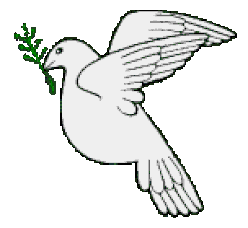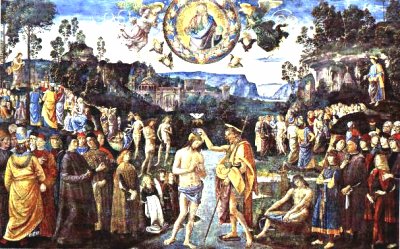Mark 1:1-13
Lesson 63
Read both the "King James Bible" and the "New Living Translation."
The Gospel According to St. Mark:
"Christ, the Servant."
Authorship:
Mark, the shortest of the four Gospels, was written in Rome by John Mark (also called Mark or Marcus) approximately twenty-five years after the crucifixion but before the destruction of Jerusalem in A.D. 70. Although Mark was not one of the original twelve disciples, he almost certainly knew Jesus personally. Some scholars believe that the unnamed young man fleeing Gethsemane naked during Jesus' arrest was Mark (Mark 14:51-52).
Mark was a converted Jew, a cousin to Barnabas (Colossians 4:10), and the son of Mary, who turned her home into a Christian meeting place (Acts 12:12). He accompanied Paul on his first missionary journey (Acts 12:25; 13:5) but fell out of favor with Paul when he left the mission early to return home to Jerusalem (Acts 13:13). Paul's disappointment in Mark created a rift between Barnabas and Paul (Acts 15:36-40). Mark later regained Paul's confidence (2 Timothy 4:11) and stood beside Paul during his first imprisonment in Rome (Philemon 1:23-24). John Mark visited numerous countries witnessing and wrote "The Gospel According to Mark," probably while in Rome when the persecution of Christians was on the rise. He also traveled with and was like a son to the apostle Peter (1 Peter 5:13). Many Bible scholars believe Mark was also Peter's interpreter and was with him when "The First Epistle General of Peter" was written. It is believed that Mark was a Roman citizen and that he founded the church in Alexandra where he died during the eighth year of the Roman emperor Nero's reign.
Purpose and Theme:
"The Gospel According to St. Mark" concentrates on Jesus' Galilean ministry (as does Matthew and Luke) and was written to show the world that Jesus was their servant and the true Messiah. Perhaps Mark 10:45 sums up the theme of this entire gospel.
"For even the Son of man came not to be ministered unto, but to minister, and to give his life a ransom for many."
In other words, Jesus didn't come to be served. He came to be a servant freeing mankind from their sins with His blood. While the "Gospel According to St. Matthew" was written for an immediate audience of Jews, Mark was written for Gentiles. This is repeatedly demonstrated in verses 3:17; 5:41;7:3-4; 7:11; 7:34; 14:36; 15:22; 15:34 and 15:42 when Mark translates Aramaic for his readers or explains Hebrew terms and customs. Something he wouldn't have to do for Jewish readers. "The Gospel According to St. Mark" is a fast-paced account of Jesus' ministry hitting on the highlights. Mark skips the entire birth of Christ and starts with His baptism. As you read, notice that the focus of Mark's Gospel is on the actions of Jesus more than His words.
Mark, the shortest of the four Gospels, was written in Rome by John Mark (also called Mark or Marcus) approximately twenty-five years after the crucifixion but before the destruction of Jerusalem in A.D. 70. Although Mark was not one of the original twelve disciples, he almost certainly knew Jesus personally. Some scholars believe that the unnamed young man fleeing Gethsemane naked during Jesus' arrest was Mark (Mark 14:51-52).
Mark was a converted Jew, a cousin to Barnabas (Colossians 4:10), and the son of Mary, who turned her home into a Christian meeting place (Acts 12:12). He accompanied Paul on his first missionary journey (Acts 12:25; 13:5) but fell out of favor with Paul when he left the mission early to return home to Jerusalem (Acts 13:13). Paul's disappointment in Mark created a rift between Barnabas and Paul (Acts 15:36-40). Mark later regained Paul's confidence (2 Timothy 4:11) and stood beside Paul during his first imprisonment in Rome (Philemon 1:23-24). John Mark visited numerous countries witnessing and wrote "The Gospel According to Mark," probably while in Rome when the persecution of Christians was on the rise. He also traveled with and was like a son to the apostle Peter (1 Peter 5:13). Many Bible scholars believe Mark was also Peter's interpreter and was with him when "The First Epistle General of Peter" was written. It is believed that Mark was a Roman citizen and that he founded the church in Alexandra where he died during the eighth year of the Roman emperor Nero's reign.
Purpose and Theme:
"The Gospel According to St. Mark" concentrates on Jesus' Galilean ministry (as does Matthew and Luke) and was written to show the world that Jesus was their servant and the true Messiah. Perhaps Mark 10:45 sums up the theme of this entire gospel.
"For even the Son of man came not to be ministered unto, but to minister, and to give his life a ransom for many."
In other words, Jesus didn't come to be served. He came to be a servant freeing mankind from their sins with His blood. While the "Gospel According to St. Matthew" was written for an immediate audience of Jews, Mark was written for Gentiles. This is repeatedly demonstrated in verses 3:17; 5:41;7:3-4; 7:11; 7:34; 14:36; 15:22; 15:34 and 15:42 when Mark translates Aramaic for his readers or explains Hebrew terms and customs. Something he wouldn't have to do for Jewish readers. "The Gospel According to St. Mark" is a fast-paced account of Jesus' ministry hitting on the highlights. Mark skips the entire birth of Christ and starts with His baptism. As you read, notice that the focus of Mark's Gospel is on the actions of Jesus more than His words.
Mark is broken down into three parts:
1) Jesus the servant (1:1-9:1) - John the Baptist; The Galilean ministry begins (1:14); The ministry to Jews; The ministry to Gentiles.
2) Jesus the sacrifice (9:2-15:47) - The Transfiguration; Final trip to Jerusalem (10:1-52); The arrest, trial, and crucifixion.
3) Jesus the victor (16:1-20) - The resurrection; Conclusion.
1) Jesus the servant (1:1-9:1) - John the Baptist; The Galilean ministry begins (1:14); The ministry to Jews; The ministry to Gentiles.
2) Jesus the sacrifice (9:2-15:47) - The Transfiguration; Final trip to Jerusalem (10:1-52); The arrest, trial, and crucifixion.
3) Jesus the victor (16:1-20) - The resurrection; Conclusion.
Study Tip:
As you read, think of ways to apply each biblical teaching into your life.
As you read, think of ways to apply each biblical teaching into your life.
Who was -
John the Baptist -
John the Baptist was the son of the Jewish priest Zacharias and mother Elizabeth (Luke 1:8-13; 3:2). Elizabeth was the Virgin Mary's cousin (Luke 1:34-36), thus making John and Jesus distant cousins. John was a prophet of the Old Covenant sent by God to preach repentance (Matthew 3:2), to bridge the gap between the Old and New Testaments, and to prepare "the way" for the Messiah's arrival (Luke 1:17), a mission so important it is mentioned in all four Gospels (Matthew 3:1-17; Mark 1:2-5; Luke 3:4-11; John 1:19-27). Jesus said there was never a person born greater than John the Baptist (Matthew 11:11). John was the first prophet in four hundred years and a lifetime Nazarite. To honor God, Nazarite Jews made religious offerings, took periodic vows not to drink alcohol, cut their hair, and to avoid contact with the dead. These vows lasted anywhere from thirty to one hundred days. Three men were under lifetime Nazarite vows, Samson (Judges 13:2-7), Samuel (1 Samuel 1:11) and John (Luke 1:15). All three were set aside by God to perform extraordinary missions. John's mission was to prepare the way for the Messiah, as prophesied in Isaiah 40:3, Malachi 3:1 and 4:5-6. He was eventually beheaded by King Herod Antipas for denouncing Herod's marriage to his niece and brothers ex-wife, Herodias, and other sins (Luke 3:19-20). To learn more about Nazarite vows read Numbers 6:1-21.
Satan -
The name Satan means "adversary." He is a real figure, a fallen angel who roams the earth (Job 2:2) continuously working against mankind (Ephesians 6:12). We first met Satan when he tested Job's faith (Job 1:6-12) in the Old Testament. In the New Testament, Jesus denounced Satan as "a murderer" and called him "the wicked one" (Matthew 13:19) who lives "not in the truth, because there is no truth in him....He is a liar" (John 8:44). Satan is the lord of evil, "the prince of this world" (John 12:31), "the god of this world" (2 Corinthians 4:4), "the spirit that now worketh in the children of disobedience" (Ephesians 2:2), "the tempter" (1 Corinthians 7:5; 1 Thessalonians 3:5), and the enemy of mankind (Luke 22:31; 1 Peter 5:8) who convinced Judas to betray Jesus (John 13:26-27) and constantly strives to get the better of us (2 Corinthians 2:11). You can read how Satan tempted Jesus in Matthew 4:1-11.
John the Baptist -
John the Baptist was the son of the Jewish priest Zacharias and mother Elizabeth (Luke 1:8-13; 3:2). Elizabeth was the Virgin Mary's cousin (Luke 1:34-36), thus making John and Jesus distant cousins. John was a prophet of the Old Covenant sent by God to preach repentance (Matthew 3:2), to bridge the gap between the Old and New Testaments, and to prepare "the way" for the Messiah's arrival (Luke 1:17), a mission so important it is mentioned in all four Gospels (Matthew 3:1-17; Mark 1:2-5; Luke 3:4-11; John 1:19-27). Jesus said there was never a person born greater than John the Baptist (Matthew 11:11). John was the first prophet in four hundred years and a lifetime Nazarite. To honor God, Nazarite Jews made religious offerings, took periodic vows not to drink alcohol, cut their hair, and to avoid contact with the dead. These vows lasted anywhere from thirty to one hundred days. Three men were under lifetime Nazarite vows, Samson (Judges 13:2-7), Samuel (1 Samuel 1:11) and John (Luke 1:15). All three were set aside by God to perform extraordinary missions. John's mission was to prepare the way for the Messiah, as prophesied in Isaiah 40:3, Malachi 3:1 and 4:5-6. He was eventually beheaded by King Herod Antipas for denouncing Herod's marriage to his niece and brothers ex-wife, Herodias, and other sins (Luke 3:19-20). To learn more about Nazarite vows read Numbers 6:1-21.
Satan -
The name Satan means "adversary." He is a real figure, a fallen angel who roams the earth (Job 2:2) continuously working against mankind (Ephesians 6:12). We first met Satan when he tested Job's faith (Job 1:6-12) in the Old Testament. In the New Testament, Jesus denounced Satan as "a murderer" and called him "the wicked one" (Matthew 13:19) who lives "not in the truth, because there is no truth in him....He is a liar" (John 8:44). Satan is the lord of evil, "the prince of this world" (John 12:31), "the god of this world" (2 Corinthians 4:4), "the spirit that now worketh in the children of disobedience" (Ephesians 2:2), "the tempter" (1 Corinthians 7:5; 1 Thessalonians 3:5), and the enemy of mankind (Luke 22:31; 1 Peter 5:8) who convinced Judas to betray Jesus (John 13:26-27) and constantly strives to get the better of us (2 Corinthians 2:11). You can read how Satan tempted Jesus in Matthew 4:1-11.
John baptizing Jesus in the Jordan River.




